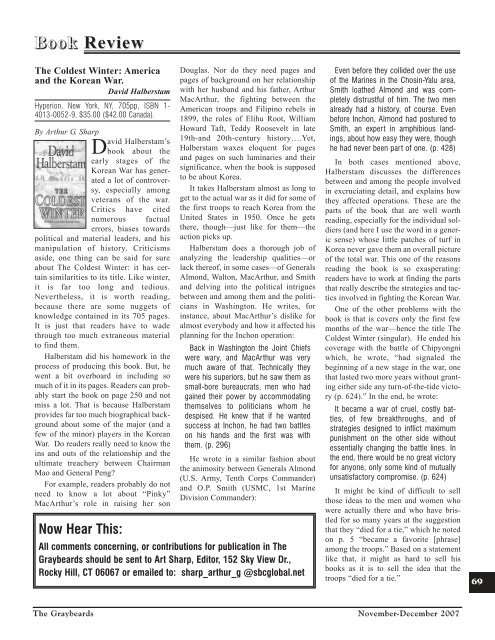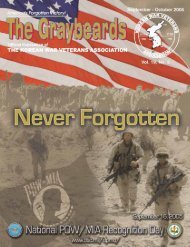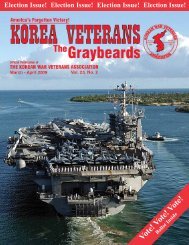Our Warmest Wishes For The Holidays - Korean War Veterans ...
Our Warmest Wishes For The Holidays - Korean War Veterans ...
Our Warmest Wishes For The Holidays - Korean War Veterans ...
You also want an ePaper? Increase the reach of your titles
YUMPU automatically turns print PDFs into web optimized ePapers that Google loves.
Book Review<br />
<strong>The</strong> Coldest Winter: America<br />
and the <strong>Korean</strong> <strong>War</strong>.<br />
David Halberstam<br />
Hyperion, New York, NY, 705pp, ISBN 1-<br />
4013-0052-9, $35.00 ($42.00 Canada).<br />
By Arthur G. Sharp<br />
David Halberstam’s<br />
book about the<br />
early stages of the<br />
<strong>Korean</strong> <strong>War</strong> has generated<br />
a lot of controversy,<br />
especially among<br />
veterans of the war.<br />
Critics have cited<br />
numerous factual<br />
errors, biases towards<br />
political and material leaders, and his<br />
manipulation of history. Criticisms<br />
aside, one thing can be said for sure<br />
about <strong>The</strong> Coldest Winter: it has certain<br />
similarities to its title. Like winter,<br />
it is far too long and tedious.<br />
Nevertheless, it is worth reading,<br />
because there are some nuggets of<br />
knowledge contained in its 705 pages.<br />
It is just that readers have to wade<br />
through too much extraneous material<br />
to find them.<br />
Halberstam did his homework in the<br />
process of producing this book. But, he<br />
went a bit overboard in including so<br />
much of it in its pages. Readers can probably<br />
start the book on page 250 and not<br />
miss a lot. That is because Halberstam<br />
provides far too much biographical background<br />
about some of the major (and a<br />
few of the minor) players in the <strong>Korean</strong><br />
<strong>War</strong>. Do readers really need to know the<br />
ins and outs of the relationship and the<br />
ultimate treachery between Chairman<br />
Mao and General Peng?<br />
<strong>For</strong> example, readers probably do not<br />
need to know a lot about “Pinky”<br />
MacArthur’s role in raising her son<br />
Now Hear This:<br />
Douglas. Nor do they need pages and<br />
pages of background on her relationship<br />
with her husband and his father, Arthur<br />
MacArthur, the fighting between the<br />
American troops and Filipino rebels in<br />
1899, the roles of Elihu Root, William<br />
Howard Taft, Teddy Roosevelt in late<br />
19th-and 20th-century history….Yet,<br />
Halberstam waxes eloquent for pages<br />
and pages on such luminaries and their<br />
significance, when the book is supposed<br />
to be about Korea.<br />
It takes Halberstam almost as long to<br />
get to the actual war as it did for some of<br />
the first troops to reach Korea from the<br />
United States in 1950. Once he gets<br />
there, though—just like for them—the<br />
action picks up.<br />
Halberstam does a thorough job of<br />
analyzing the leadership qualities—or<br />
lack thereof, in some cases—of Generals<br />
Almond, Walton, MacArthur, and Smith<br />
and delving into the political intrigues<br />
between and among them and the politicians<br />
in Washington. He writes, for<br />
instance, about MacArthur’s dislike for<br />
almost everybody and how it affected his<br />
planning for the Inchon operation:<br />
Back in Washington the Joint Chiefs<br />
were wary, and MacArthur was very<br />
much aware of that. Technically they<br />
were his superiors, but he saw them as<br />
small-bore bureaucrats, men who had<br />
gained their power by accommodating<br />
themselves to politicians whom he<br />
despised. He knew that if he wanted<br />
success at Inchon, he had two battles<br />
on his hands and the first was with<br />
them. (p. 296)<br />
He wrote in a similar fashion about<br />
the animosity between Generals Almond<br />
(U.S. Army, Tenth Corps Commander)<br />
and O.P. Smith (USMC, 1st Marine<br />
Division Commander):<br />
All comments concerning, or contributions for publication in <strong>The</strong><br />
Graybeards should be sent to Art Sharp, Editor, 152 Sky View Dr.,<br />
Rocky Hill, CT 06067 or emailed to: sharp_arthur_g @sbcglobal.net<br />
Even before they collided over the use<br />
of the Marines in the Chosin-Yalu area,<br />
Smith loathed Almond and was completely<br />
distrustful of him. <strong>The</strong> two men<br />
already had a history, of course. Even<br />
before Inchon, Almond had postured to<br />
Smith, an expert in amphibious landings,<br />
about how easy they were, though<br />
he had never been part of one. (p. 428)<br />
In both cases mentioned above,<br />
Halberstam discusses the differences<br />
between and among the people involved<br />
in excruciating detail, and explains how<br />
they affected operations. <strong>The</strong>se are the<br />
parts of the book that are well worth<br />
reading, especially for the individual soldiers<br />
(and here I use the word in a generic<br />
sense) whose little patches of turf in<br />
Korea never gave them an overall picture<br />
of the total war. This one of the reasons<br />
reading the book is so exasperating:<br />
readers have to work at finding the parts<br />
that really describe the strategies and tactics<br />
involved in fighting the <strong>Korean</strong> <strong>War</strong>.<br />
One of the other problems with the<br />
book is that is covers only the first few<br />
months of the war—hence the title <strong>The</strong><br />
Coldest Winter (singular). He ended his<br />
coverage with the battle of Chipyongni<br />
which, he wrote, “had signaled the<br />
beginning of a new stage in the war, one<br />
that lasted two more years without granting<br />
either side any turn-of-the-tide victory<br />
(p. 624).” In the end, he wrote:<br />
It became a war of cruel, costly battles,<br />
of few breakthroughs, and of<br />
strategies designed to inflict maximum<br />
punishment on the other side without<br />
essentially changing the battle lines. In<br />
the end, there would be no great victory<br />
for anyone, only some kind of mutually<br />
unsatisfactory compromise. (p. 624)<br />
It might be kind of difficult to sell<br />
those ideas to the men and women who<br />
were actually there and who have bristled<br />
for so many years at the suggestion<br />
that they “died for a tie,” which he noted<br />
on p. 5 “became a favorite [phrase]<br />
among the troops.” Based on a statement<br />
like that, it might as hard to sell his<br />
books as it is to sell the idea that the<br />
troops “died for a tie.”<br />
69<br />
<strong>The</strong> Graybeards November-December 2007

















